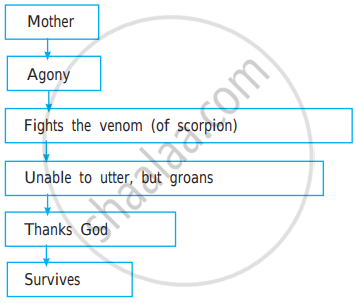Advertisements
Advertisements
Question
Get into pairs and discuss the following with your partners and complete the table.
Many people are superstitious. This means that they have a belief for which they have no logical reason.
An example of superstition is that - walking under a ladder brings bad luck. In pairs, list any superstitions that you know of.
| Superstition | What it implies |
| (1) Smashing a mirror | Brings seven years of bad luck. |
| (2) | |
| (3) | |
| (4) | |
| (5) |
Solution
| Superstation |
What it implies |
|
(1) Walking under a ladder |
1. Brings bad luck. |
|
(2) Smashing a mirror |
2. Brings seven years of bad luck. |
|
(3) A black cat crossing your path |
3. A bad omen. |
|
(4) Twitching of the eye |
4. Brings bad luck. |
|
(5) Sweeping your house after sunset |
5. Goddess Lakshmi will walk out. |
|
(6) Going near a peepal tree at night |
6. The ghosts will kill you. |
|
(7) Putting a black dot on your child's face |
7. Will ward off the evil eye. |
APPEARS IN
RELATED QUESTIONS
Read the following extract and do the activities.
I remember the night my mother
was stung by a scorpion. Ten hours
of steady rain had driven him
to crawl beneath a sack of rice.
Patting with his poison – flash
Of diabolic tail in the dark room -
he risked the rain again.
The peasants came like swarms of flies
And buzzed the name of God a hundred times
to paralyse the Evil One.
With candles and with lanterns
throwing giant scorpion shadows
on the mud-baked walls
they searched for him: he was not found.
They clicked their tongues.
With every movement that the scorpion made his poison
moved in Mother’s blood, they said.
(A1) Choose the correct option for the following.
(1) The incident in the poem took place in
(i) the morning (ii) the night
(iii) the afternoon (iv) the evening
(2) ‘The Evil’ mentioned in the poem was
(i) the peasant (ii) the God
(iii) the scorpion (iv) the mother
(3) The scorpion crawled beneath a sack of
(i) sugar (ii) a wheat
(iii) corns (iv) rice
(4) The peasants are compared with
(i) flock of sheep (ii) group of monkeys
(iii) swarms of flies (iv) herds of cattle
(A2) Write the reactions of the people when they knew that the mother was stung by a scorpion.
(i)..................................................................
(ii)................................................................
(iii)...............................................................
(iv)...............................................................
(A3) Write down the rhyming words from the stanzas for the following.
(i) fight - (ii) clash -
After reading the poem, complete the following. What happens? There are three main parts of the poem. Do you know what they are about? The first one is done for you.
| Lines | What is happening? |
| 1-7 | The scorpion comes into the home to escape the rain and stings the poet’s mother. |
| 8-33 | |
| 34-48 |
Complete the following table.
| Scorpion | |
| Many images of the scorpion contrast in the opening lines of the poem. Find examples of each and add them to the columns below. | |
| Timid | Dangerous |
|
(1) hides _________ (2) ___________ back |
(i) Diabolic ____________ (ii) ____________ |
Choose the correct alternative.
This is a _____________ poem as it tells a story.
Choose the correct alternative.
The poem does not have a rhyme scheme, which means the poem is a perfect example of a ___________.
Choose the correct alternative.
The poem is titled ‘Night of the Scorpion’, for, the major part of the poem _______________.
Read the poem and complete the table showing the qualities of the father and mother giving sufficient evidence from the poem.
| Qualities | |
| Father | Mother |
Expand the flow-chart in writing a paragraph in your own words.

The poet has used various kinds of imagery to create an image that appeals to our senses. Pick out various kinds of imagery and complete the table.
| Visual imagery appealing to the eye | Tactile imagery (sense of touch) | Sound imagery | Internal sensations, feelings, and emotions |
| (1) Scorpion crawling beneath a sack of rice | (1) _________ ____________ ___________ |
(1) buzzed the name of God | (1) fear |
| (2) ___________ ___________ ___________ |
(2) Father pouring paraffin on the toe | 2) ___________ ___________ ___________ |
2) ___________ |
Read the following extract and do the given activities.
A1. Match the following:
| (1) Misfortunes | mud-baked |
| (2) Ambition | bad luck |
| (3) World | goal |
| (4) Wall | unreal |
|
With candles and with lanterns -Nissim Ezekiel |
A2. Write two words ending in "on".
A3. Give an example of "metaphor" from the extract.
